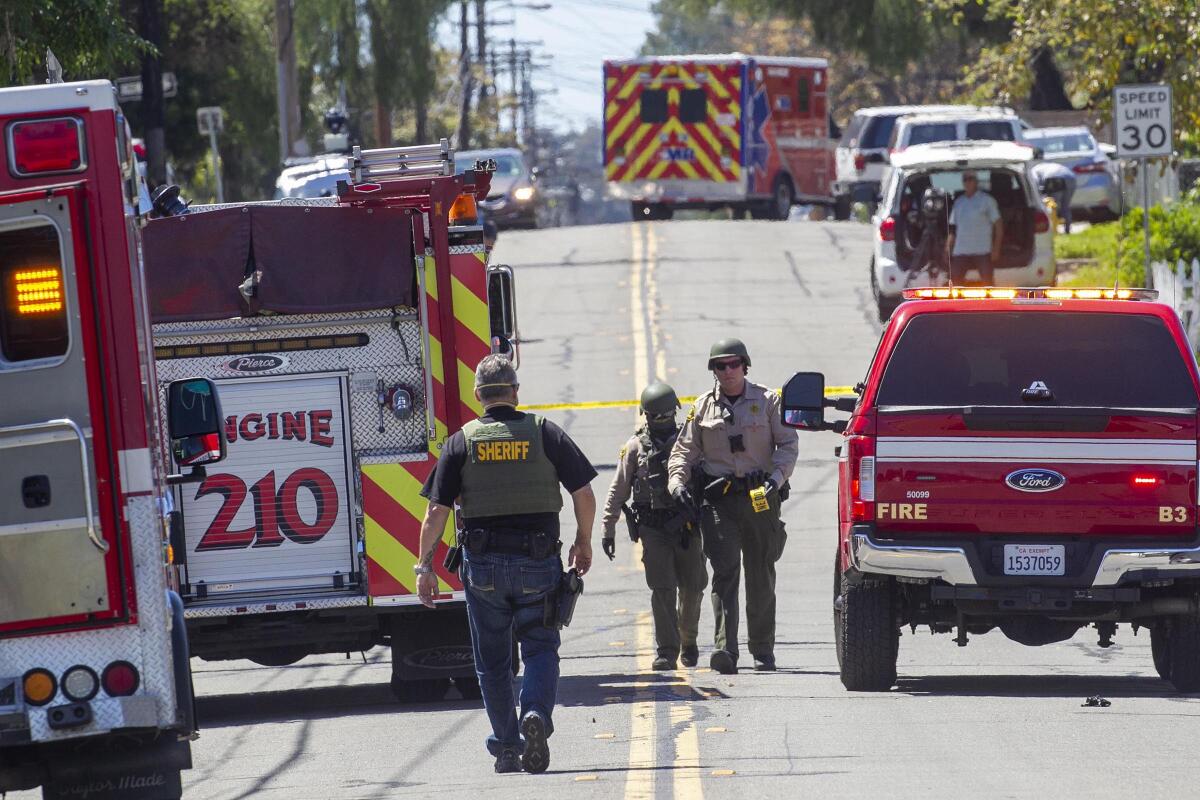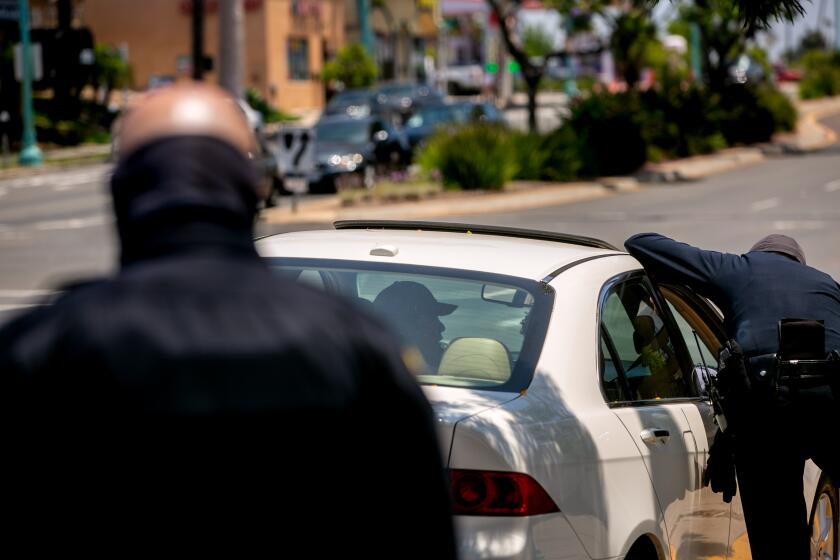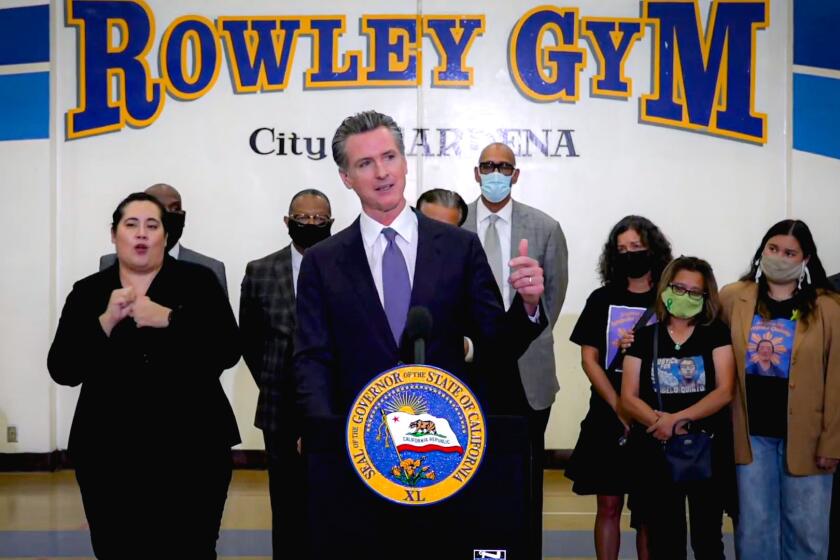San Diego County Sheriff’s Department encrypts radio communications; lack of transparency decried

- Share via
The San Diego County Sheriff’s Department has encrypted its radio communications, blocking the public from listening to information about safety matters in real time.
The department is the latest law enforcement agency in the county and state to cut off access to radio communications in response to a California Department of Justice mandate that required agencies to protect certain personal information that law enforcement personnel obtain from state databases. Such information — names, driver’s license numbers, dates of birth and other information from the California Law Enforcement Telecommunications System, or CLETS — sometimes is broadcast over police radios.
The October 2020 mandate gave agencies two options: to limit the transmission of database-obtained personal information on public channels or to encrypt their radio traffic.
Police reform advocates say the switch to encrypted channels is problematic. The radio silence, they say, will force members of the public, including the news media, to rely on law enforcement agencies’ discretion in releasing information about public safety matters.
A new report was released about traffic and pedestrian stops by California law enforcement agencies. The data include a breakdown of race/ethnicity with troubling findings of bias.
“What this does, it inhibits transparency and accountability,” said Yusef Miller, of the North County Equity and Justice Coalition and the Racial Justice Coalition of San Diego.
“We as the community need to have transparency with law enforcement — where things are happening in our community, where people are being stopped and pulled over,” Miller said at a news conference Friday morning.
A sheriff’s spokesperson has said the department is exploring ways to disseminate information about incidents as they unfold. One idea is an online page that would show information about calls to which deputies respond.
In San Diego County, the only policing agency that said it did not plan to fully encrypt its radio communications was the San Diego Police Department, which uses unencrypted dispatch channels as well as separate, encrypted channels through which personal information can be shared privately.
Police officers sometimes run background checks on their own, using their department-issued cellphones or computers in their patrol vehicles. Other times, they ask dispatchers to pull the information from the databases. That’s usually when personal information is broadcast over radio traffic.
The sheriff’s department made the switch to encrypted channels Tuesday. Lt. Amber Baggs, a spokesperson, said full encryption was the better option for the department to comply with the Department of Justice order.
“It’s not always feasible for us to switch channels,” Baggs said, adding that it could be “difficult or sometimes impossible” for deputies to switch from an unencrypted to an encrypted channel to protect personal information, especially in situations that unfold quickly.
Officials from several police departments across the county took a similar stance in explaining their switch to encryption to the Union-Tribune in July. Some agencies said it wasn’t feasible for their dispatchers to manage both unencrypted and encrypted channels.
The changes include raising the minimum age for officers to 21 and allowing badges to be taken away for excessive force, dishonesty and racial bias.
For years, anyone with a scanner has had the ability to tune into the unencrypted radio communications, more so in recent years with the advent of web and cellphone scanner apps.
Miller, from the Racial Justice Coalition of San Diego, said Friday outside sheriff’s department headquarters that the move to full encryption of radio communications runs contrary to the current demand for more transparency from law enforcement agencies.
“We need this type of access for trust and transparency’s sake,” he said. “We cannot wait for law enforcement to inform us of things that are happening in our community. Police shootings, any active shooter, rapes, thefts — these directly impact our families, and we need to know and be ahead of what going on.”
Miller noted that he was not advocating for access to the personal data of people being investigated by the sheriff’s department or other law enforcement agencies.
Darwin Fishman, who has served on the city of San Diego’s Community Review Board on Police Practices, criticized the sheriff’s department’s record on transparency and said full encryption of radio communication is the “wrong way to move into this era.”
“[For] folks that are doing formal cop watch or people that are simply listening in and seeing about whether it’s fires or something in their apartment building, some kind of police action, [full encryption] really can have a significant impact,” Fishman said.
A California appeals court has upheld the firing of two Los Angeles police officers who were caught playing Pokémon Go instead of responding to a robbery at the Crenshaw Mall in 2017.
One person who often listens to radio scanner traffic is Imperial Beach resident Marcus Boyd. He said he regularly video records encounters between law enforcement officers and the public — he views it as a way to hold officers accountable — and sometimes relies on scanner traffic to accomplish the task.
“Now all we have is silence,” Boyd said in a recent interview. He also spoke at the Friday news conference.
Boyd pointed to state laws enacted in recent years that aim to increase transparency, and faulted the Department of Justice for crafting an order that slows that progress.
“That [momentum] gave us one step forward,” he said, “and [agencies] are taking two steps back.”
He added, “This is giving them the ability to hide.”
Boyd, a former database programmer, has built his own tool: CopWatcher, a cellphone app with a variety of features, including a database with publicly available information about San Diego police officers and county sheriff’s deputies, including hiring dates and salaries. He said the app, which is in a testing phase, will allow users to write reviews for officers and deputies and file complaints with the appropriate entities. It will also allow users to make a note of police activity, allowing “cop watchers” to respond, Boyd said.
The move toward encryption hasn’t generated much public outcry, and Boyd said he thinks that’s because many people aren’t aware that scanner traffic had been publicly available.
San Diego Union-Tribune editor Dana Littlefield contributed to this report.
More to Read
Sign up for Essential California
The most important California stories and recommendations in your inbox every morning.
You may occasionally receive promotional content from the Los Angeles Times.














